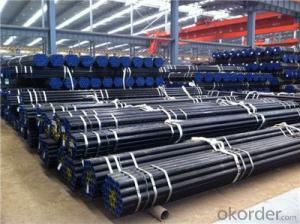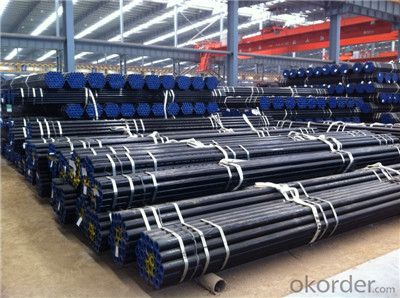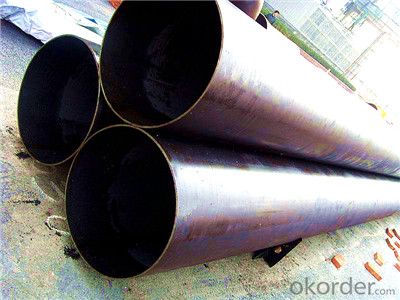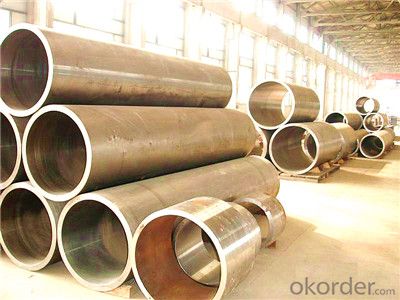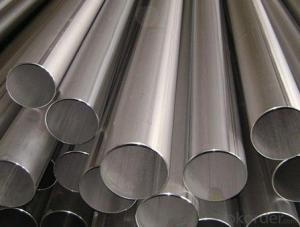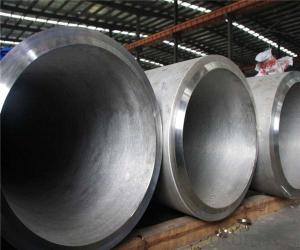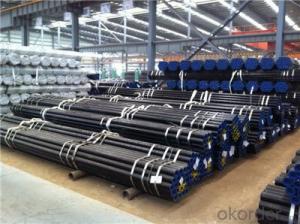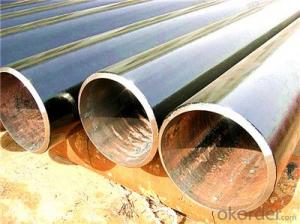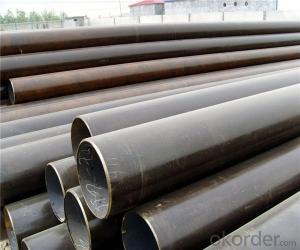CNBM seamless steel tubes hot selling with high quality and best price
- Loading Port:
- Tianjin
- Payment Terms:
- TT OR LC
- Min Order Qty:
- 50 m
- Supply Capability:
- 200000 m/month
OKorder Service Pledge
OKorder Financial Service
You Might Also Like
PRODUCT DETAILS
1.Structure of Seamless Steel Pipe Description:
A large amount of Seamless Steel Pipes is offered to the clients at cost effective rates. These pipes are extremely durable, resistant to corrosion and have high tensile strength. Our pipes are used in nuclear plants, power plants, refineries and construction industry across the country. Furthermore, we are capable of providing these seamless pipes to the clients in bulk quantity.
2.Main Features of the Steel Pipe:
• High manufacturing accuracy
• High strength
• Small inertia resistance
• Strong heat dissipation ability
• Good visual effect
•Reasonable price
3.Packaging & Delivery:
| Packaging Details: | Seaworthy packages, bundles wrapped with strong steel strip |
| Delivery Detail: | 15-30 days after received 30% TT |
4.Seamless Steel Pipe Specification:
| Standard: | GB, DIN, ASTM,ASME, ASTM A106-2006, ASTM A53-2007 |
| Grade: | 10#,20#, 45#, 16Mn |
Thickness: | 8 - 33 mm |
| Section Shape: | Round |
| Outer Diameter: | 133 - 219 mm |
| Place of Origin: | Shandong, China (Mainland) |
| Secondary Or Not: | Non-secondary |
| Application: | Hydraulic Pipe |
| Technique: | Cold Drawn |
| Certification: | API |
| Surface Treatment: | factory state or painted black |
| Special Pipe: | API Pipe |
| Alloy Or Not: | Non-alloy |
| Length: | 5-12M |
| Outer Diameter: | 21.3-610mm |
5.Product pictures
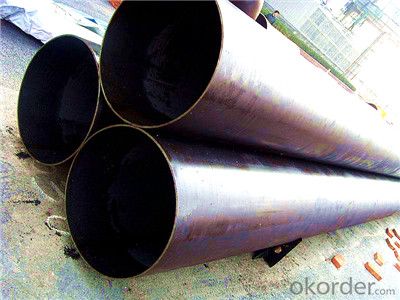
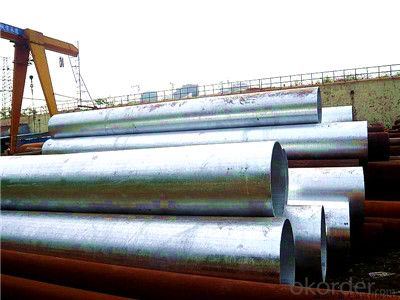
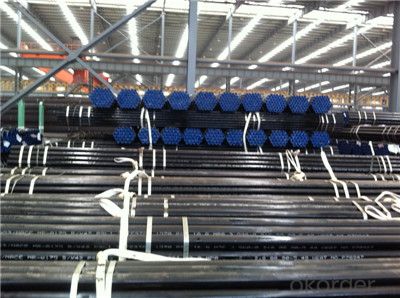
6.FAQ of Seamless steel pipe:
①How is the quality of your products?
Our products are manufactured strictly according to national and internaional standard, and we take a test
on every pipe before delivered out. If you want see our quality certifications and all kinds of testing report, please just ask us for it.
Guaranteed: If products’ quality don’t accord to discription as we give or the promise before you place order, we promise 100% refund.
②How about price?
Yes, we are factory and be able to give you lowest price below market one, and we have a policy that “ for saving time and absolutely honest business attitude, we quote as lowest as possible for any customer, and discount can be given according to quantity”,if you like bargain and factory price is not low enough as you think, just don’t waste your time.Please trust the quotation we would give you, it is professional one.
③Why should you chose us?
Chose happens because of quality, then price, We can give you both.Additionally, we can also offer professional products inquiry, products knowledge train(for agents), smooth goods delivery, exellent customer solution proposals.Our service formula: good quality+good price+good service=customer’s trust.
SGS test is available, customer inspection before shipping is welcome, third party inspection is no problem.
Any question, pls feel free to contact us !
- Q: How are steel pipes used in the telecommunications network infrastructure?
- Steel pipes are widely used in the telecommunications network infrastructure for various purposes. One of the primary uses of steel pipes in this industry is for the installation of underground cable conduits. These conduits protect the telecommunications cables from external factors such as moisture, rodents, and physical damage. Steel pipes provide excellent strength and durability, ensuring the long-term protection of the cables. Additionally, steel pipes are used in the construction of telecom towers and antenna masts. These structures need to be sturdy and able to withstand harsh weather conditions. Steel pipes offer the necessary strength, stability, and resilience required for telecom towers to support antennas and other equipment. They can be easily assembled, allowing for efficient deployment and maintenance of the network infrastructure. Moreover, steel pipes are essential for the installation of fiber optic cables. Fiber optic cables transmit data at high speeds using light signals. To ensure optimal performance, these cables need to be protected from any external interference. Steel pipes serve as a conduit for fiber optic cables, shielding them from electromagnetic interference and other potential disruptions. In summary, steel pipes play a crucial role in the telecommunications network infrastructure. They are used for the installation of underground cable conduits, construction of telecom towers, and protection of fiber optic cables. The strength, durability, and versatility of steel pipes make them an ideal choice for ensuring the reliability and functionality of telecommunications systems.
- Q: How do steel pipes handle ground settlement?
- Steel pipes are generally robust and durable, making them well-suited for handling ground settlement. The flexibility and strength of steel allow the pipes to withstand the shifting and settling of the ground without significant damage. Steel pipes have a high resistance to deformation, which means they can maintain their shape and structural integrity even when the ground settles or moves. When the ground settles, steel pipes can accommodate the movement by flexing and bending slightly. This flexibility allows them to adjust to changes in the ground without breaking or cracking. Additionally, steel pipes are often designed with joints that can absorb and distribute stress caused by ground settlement. Furthermore, steel pipes have a smooth interior surface that minimizes friction and resistance to the flow of materials. This feature is particularly important when the ground settles because it reduces the likelihood of clogs or blockages due to debris or sediment settling in the pipes. In summary, steel pipes are well-equipped to handle ground settlement due to their strength, flexibility, and resistance to deformation. They can adapt to the movement of the ground without compromising their structural integrity, making them a reliable choice for various applications, including underground infrastructure and pipeline systems.
- Q: How are steel pipes used in water treatment plants?
- Steel pipes are commonly used in water treatment plants to transport and distribute water throughout the facility. They are used for various purposes, such as conveying raw water from the source to the treatment plant, distributing treated water to different areas, and carrying wastewater to the appropriate treatment processes. The durability and strength of steel pipes make them suitable for handling the high pressure and corrosive nature of water in these industrial settings.
- Q: How are steel pipes used in the oil and gas industry?
- Steel pipes are extensively used in the oil and gas industry due to their durability and strength. They are used for various purposes like drilling, transportation, and processing of oil and gas. Steel pipes are employed in drilling wells, providing a conduit for the extraction of oil and gas from the ground. Additionally, they are used for gathering and transporting hydrocarbons from the wellhead to processing facilities or storage tanks. Steel pipes also play a crucial role in the construction of refineries and petrochemical plants, where they are used for the transportation of various fluids and gases involved in the refining process.
- Q: Are steel pipes suitable for wastewater treatment plants?
- Indeed, wastewater treatment plants find steel pipes to be a suitable option. Their exceptional strength and durability make them a prevalent choice in this field. The ability to endure high pressure and resist corrosion renders them highly suitable for transporting wastewater and various fluids within the challenging environments of treatment plants. Moreover, the ease of welding and joining steel pipes allows for flexibility in designing and installing the piping system. All in all, steel pipes prove to be a dependable and economical selection for wastewater treatment plants.
- Q: Are steel pipes suitable for potable water applications?
- Yes, steel pipes are suitable for potable water applications. Steel pipes are commonly used for transporting water in various industries and municipal water systems. They are known for their durability, strength, and resistance to corrosion, making them a reliable choice for potable water systems. Steel pipes also have the advantage of being able to withstand high pressure and temperature conditions, making them suitable for both hot and cold water applications. Additionally, steel pipes can be easily welded, ensuring leak-free connections. However, it is important to note that the quality of the steel used and proper maintenance are crucial factors in ensuring the safety and suitability of steel pipes for potable water applications. Regular inspection and maintenance should be done to prevent corrosion and ensure the integrity of the pipes.
- Q: Are steel pipes suitable for underground cable protection?
- Yes, steel pipes are suitable for underground cable protection. Steel pipes provide excellent durability and strength, making them ideal for protecting cables from external factors such as physical damage, moisture, and corrosion. They are able to withstand the weight of the soil and any potential pressure from above, ensuring the cables remain secure and protected. Additionally, steel pipes can be easily welded or connected to create a continuous and seamless conduit, further enhancing their effectiveness in underground cable protection.
- Q: Are steel pipes suitable for potable water systems?
- Yes, steel pipes are suitable for potable water systems. Steel pipes are commonly used in potable water systems due to their strength, durability, and resistance to corrosion. They can withstand high pressure and are able to carry large volumes of water. Additionally, steel pipes can be easily welded together, making them a versatile choice for various applications in potable water systems. However, it is important to note that proper maintenance and regular inspections are necessary to prevent any potential issues such as rust or contamination.
- Q: Can steel pipes be used for air conditioning systems?
- Yes, steel pipes can be used for air conditioning systems. Steel pipes are commonly used in air conditioning systems for their durability, strength, and resistance to corrosion. They can effectively transport refrigerant and withstand the high pressure and temperature conditions involved in air conditioning operations.
- Q: How are steel pipes used in the chemical processing industry?
- Steel pipes are commonly used in the chemical processing industry for various purposes such as transporting chemicals, gases, and liquids, as well as for structural support and containment. They are highly durable, corrosion-resistant, and can withstand high temperatures and pressures, making them ideal for handling and conveying hazardous substances safely.
Send your message to us
CNBM seamless steel tubes hot selling with high quality and best price
- Loading Port:
- Tianjin
- Payment Terms:
- TT OR LC
- Min Order Qty:
- 50 m
- Supply Capability:
- 200000 m/month
OKorder Service Pledge
OKorder Financial Service
Similar products
Hot products
Hot Searches
Related keywords
